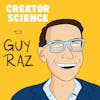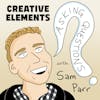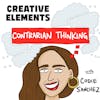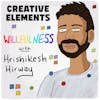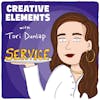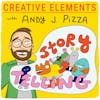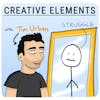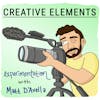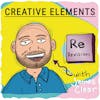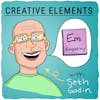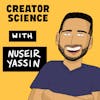
#159: Nuseir Yassin – The price of growing Nas Daily to 12 million subscribers
Play EpisodeThe sacrifices behind extraordinary success.
WATCH
▶️ Watch this episode on YouTube
***
EPISODE DESCRIPTION
Nuseir Yassin started the channel Nas Daily with the mission of highlighting incredible people and places on the planet.
He set a goal to post a video every day for 1,000 straight days. 1,000 STRAIGHT DAYS… and he did it.
Amassing 12 million subs, 6 billion views, and started two multi-million dollar companies along the way. He’s living out every YouTuber’s wildest dreams…right?
So in this episode, you’ll learn:
- How Nuseir manages outside distractions
- Why you need to listen to your inner voice
- The Sniper vs Machine Gun creator philosophy
- And the actual cost of success
Full transcript and show notes
Nuseir's Website
Follow Nuseir Community / YouTube / LinkedIn / Twitter
***
TIMESTAMPS
(00:00) YouTube Success Isn’t What You Think
(01:08) The Cost of Success
(04:29) Listening to Your Inner Voice vs Outer Voice
(06:24) Why You Don’t Hit Deadlines
(10:59) Why You Should be Like Arnold Schwarzenegger
(14:31) The 3 Things You Can Focus On
(18:47) Snipers vs Machine Guns
(21:33) It’s Normal to Feel Like a Failure
***
CONNECT
🙏 Make a guest or mailbag request
📝 Check out our curated Playlists
***
SPONSORS
💼 View all sponsors and offers
***
SAY THANKS
💜 Leave a review on Apple Podcasts
Learn more about your ad choices. Visit megaphone.fm/adchoices
Nuseir Yassin [00:00:00]:
It was roughly half the time where I was like, why make the video? No one's gonna watch it. It's gonna suck. I don't feel like it. That's Nusayer Yasin.
Jay Clouse [00:00:09]:
Nusayer started the channel Nos daily with a mission of highlighting incredible people and places on the planet. He set a goal to post a video every day for 1000 straight days. 1000 straight days. and he did it. Amassing 12,000,000 subscribers, 6,000,000,000 views, and starting 2 multi $1,000,000 companies along the way. He's living out every YouTuber's wildest dreams, right?
Nuseir Yassin [00:00:34]:
People see the benefits of what you get because the benefits are public, but the price is very private. I just lost my 60 relationship, you know. And in all honesty, that is the price I'm paying, you know, in which I committed more to my work than to relationship, and that is not something to be proud of, but it is something that happened.
Jay Clouse [00:00:52]:
And life is not just beautiful. So in this episode, you'll learn how new sire manages outside distractions, why need to listen to your inner voice, the sniper versus machine gun creator philosophy, and the actual cost of success. I spent the one minute this morning looking at your website and reviewing, remembering the whole story of your journey. And, man, it seems like so much work. It doesn't leave a lot of time for scrolling Twitter. answering Instagram, DMs, things like that. And you have a large following now. I'm sure even at the time, you had a large following relative to most people listening to this show. So how did you manage your relationship to outside distractions that were not the work themselves? So it's very simple. Right? The first thing I I I freed my self from material distractions.
Nuseir Yassin [00:01:45]:
What are material distractions, clothing, accessories, shopping, all that stuff became, unimportant to me. Right? So I wear the same thing. I had the same t shirt. I had the same shoes. I had the same, look. I don't ever need to go change my looks. So that helped a lot. I don't have any material objects in my life. I didn't have a home. I didn't have anything in my home. Nothing that I own. Nothing is important to own. So that helped a lot. Second thing is I was single when I started. I have nobody that I can commit to. Nobody that requires time for me, nobody brought my attention. And that really helped a lot. 3rd is I made sure I don't have any financial hurdles. So I made sure to save enough money so that I don't have to worry about out of about money. So as you can tell, I'm freeing myself. Oh, and 4th friends I definitely did not stay in touch with friends. I basically just disappeared off the planet. And I said, I'm going on a trip around the world. I'll see you when I'm back. No. Now, no friends, no girlfriend or boyfriend, no financial strain, no objects, no clothing, and no Twitter. For some parts, also there was no drinking, no caffeine, no drugs, just me and a camera. Perfect.
Jay Clouse [00:02:58]:
So I love that you're talking about this. People don't talk about this. Like, there there are probably people out there who are looking at your life, your channel, the things that you have and saying, I want that. and they have an incomplete understanding of the trade offs you made. Yeah. The singular focus you had to achieve that. I I wish more people would think about that when they're comparing themselves to others because we do it all the time, but we don't we don't ask ourselves, like, am I willing to take the same path? we don't reverse engineer it, see what that path is. Totally. People see the benefits
Nuseir Yassin [00:03:31]:
of what you get because the benefits are very public, but the price is very private. the price that you pay is very private. So the price I paid, I think, is lower than the than the benefit I got, so I'm good. but I still pay the price. You know, I don't have any close friends. I'm not very close with family. I'm not very I just lost my sister relationship. You know? And in all honesty, that is the price I'm paying, you know, in which I committed more to my work than to my relationship, and that is not something to be proud of, but it is something that happened. and life is not just beautiful. So, yeah, I, you know, I continuously pay the price, but, you know, the benefits are astronomical. not not financially, but the benefits are astronomical in terms of meaning, impact, joy. You know, not everybody not everybody's willing to pay the price. for some people hanging out with their friends is better than anything in the world. And it is, and there's nothing wrong with that. Everybody has different, judgments.
Jay Clouse [00:04:30]:
The second point of the timeline after day 1 of your 1000 day journey is day 2:30, almost quit. And I wanna talk about that moment a little bit because I think that's something a lot of people can relate to. And at that point, you would create a 230 videos, which is still almost twice as many videos as I have on my channel having started YouTube a year ago. And so I'm halfway to almost quitting in in in your journey's terms. So I'd love to hear what that moment was You know, I put day 2 130 as a day I almost quit, but in reality, it was day 2 30, 2 29, 2 27, 2 20
Nuseir Yassin [00:05:00]:
2 to 22 to 190. It was roughly half the time where I was like, why make the video? No one's gonna watch it. It's gonna suck. I don't feel like it. And so I put that day as a reminder that there were days in which I wouldn't be here talking to you. And I just feel so goddamn lucky to be here talking to you and being worthy of a podcast, because there was a possibility of me just going back, finding a job, and ditching this whole video thing. And I guess the reason why I didn't do that. The question is why did you not quit? Not why everybody feels quitting, but why did you not quit? And I think there's always that intuition. You know, there is the there's the outer voice and there's the inner voice. The outer voice is the news. It's your friends, it's a family, it's society. That's the outer voice. And there's the inner voice that tells you, this is wrong, this is right. Keep going, or stop. invest in this relationship or don't. And a lot of us listen to the outer voice, not many of us listen to the inner voice. So I've learned. I'm learning slowly. For the last 10 years, I'm learning how to mute the outer voice and how to amplify the inner voice. oftentimes, the inner voice is more right than wrong, and the outer v outer voice is oftentimes more wrong than right now from my experience.
Jay Clouse [00:06:22]:
So that's that's kind of like why it kept going. The next point of the timeline, that kinda blew my mind on day 1200. 200 days after you finish your 1000 day challenge. You launched a book. You're saying I worked really hard. I had 25 days to write this book. That seems like such a huge effort that a lot of people listening to this would be, like, 25 days to write a book. I'm not sure I could write a book and in 25 months, 25 years. So tell me more about the narrative in your head that allowed you to take that project on and complete it in that period. time? It's called Parkinson's
Nuseir Yassin [00:06:58]:
Law, not Parkinson's disease, Parkinson's Law, which something that has really transformed the way I look at life. which basically says work expands to the time allowed for it. If you allow 2 years to write a book, most likely you will work on it for 2 years. It does not guarantee the quality to be ten times better than if you worked on it for 1 month. And so I gave myself 25 days to write this book. That is my deadline. And so all my work must fit into this deadline, and I am very obsessive about hitting deadlines. So with a 1000 day videos, I had 24 hours at 24 hours to create a video. Right? That's my deadline. So my work can only expand to 24 hours to make the video. So the same concept of 24 hours to make a video now 25 days to write a book. Work expense to the time allowed forth. Do you do you do, like, a day by day planning in that period of time to be like, okay. If that's 25 days, I have this goal of this many pages, I'm gonna break down what each goal for each day is? How did you mark your progress through that period of time? With the book, I wasn't as, like, anal about marking progress and whatnot. It was just like you you'll feel it when you're almost done or you're not. But with the videos, I've I'm very anal about it, right, which is, okay, by 11 AM, I must have a video idea. By 2 PM, I must have a script. By 5 PM, I must shoot it. By, you know, 11 PM, I must have it edited. that's really the work that must not expand beyond the time allowed for it. And so it was very, very, like, it was very systemized. It was very, like, basically, all I'm trying to say is what I did is nothing special. Yes. Making videos is hard. creating content is hard and 10, 12 hours a day spent on making videos. It's hard. But actually, you know, Muslims pay five times a day for 50 years. My mom prays five times a day for 50 years. She has to wake up at 5 AM. She has to pray, be clean, five times a day. It's really, really impressive. the ability to consistently create output, which in this case is praying. so what I'm trying to say is in the world today, we have billions of people that are highly committed to their craft. It's just it's called religion. Basically, my work is a form of religion. is I view it as a form of religion. And because I view it as important as religion to me, then I have no problem committing And I think the reason why people don't commit is simply because they don't believe this thing is religious. They don't believe it. They don't believe this thing is important. because if they truly believe this thing is important, the human body is capable of incredible things. I love drilling into this, and and thank you for humoring me because One of the most common things I hear from creators is, like, they lack consistency.
Jay Clouse [00:09:45]:
They feel demotivated. Like, they let things expand. They're they're looking for the muse and and and whatever. it's it's really helpful to actually talk to somebody who is so able to set deadlines, hit deadlines, stick to a schedule, and see it as the work. And and I like talking about this. So other people start to expand their thinking on it and see that they are also capable of doing this type of thing. Right. I mean, it's a very simple question. It's a very simple way to understand this better, which is, Jay, if this podcast does not get uploaded,
Nuseir Yassin [00:10:18]:
Will somebody die?
Jay Clouse [00:10:19]:
No.
Nuseir Yassin [00:10:20]:
Okay. So that's why sometimes it becomes very difficult to, like, assign value to what you're doing because you don't believe it's life and death. And maybe it's irrational from my side, but for every video I was making, I assigned a life and death value. in which if this video does not get created, somebody will die, whether it's me, or whether it's the viewer or whatever because this video could help him so much. It will change your life. Yes. It's irrational. Yes. It's very self absorbed and self centered. but assigning
Jay Clouse [00:10:55]:
importance to my work has helped me achieve it. How do you think about the goal line? because I feel like a lot of people in your position and my position, we have this this tendency to move the goal posts just as soon as we get to the goal posts. Always. What's your relationship to the goal post?
Nuseir Yassin [00:11:14]:
I feel like I'm never gonna touch the fucking goal post. And it, it really bothers me because it's it's just it's it's the reason I'm so distressed. but it is, have you seen the Arnold documentary No. No. No. I haven't seen that one. No. Okay. So it's it's a new one. It's an auto documentary. Right? But basically, like Arnold lived his life in 3 categories as a body builder, And then he became an actor, then he became a politician. So he has 3 chapters in his life. And I thought that was really interesting because I'm also trying to build 3 to 4 or 5 chapters in my life. So every time you close a chapter, there's a new chapter that comes out, and that chapter becomes as unreachable as ever because you start from 0. So, yes, I've hit my goal post of a 1000 video challenge. but then then immediately the day after my new goal post was a thousand person company. And then I'm like, fuck. I'm at 0. I'm back to 0. So I'm humbled. I'm embarrassed. I'm making mistakes as an entrepreneur. I still make mistakes as an entrepreneur. So you have a thousand person thing. So I you're it's a goal. and then shit. There's another goalpost. So now I'm in the middle of my second act. My first act as a creator is done. I spent 6 years on it. I'm done with it. My second act now is an entrepreneur. And here, I feel still as a beginner, and that's that's basically the source of my distress.
Jay Clouse [00:12:41]:
Sometimes I ask myself, like, I get in these moods where things in the business feel easy, and then I get uncomfortable because I've just trained myself to believe that Everything should be hard if it's worth doing. Why is this not hard anymore? So, like, going straight, some new hard thing. And there's another part of me that says, Well, why don't I just enjoy the fruits of my labor for a little bit? It's tough. It's a tough balance. Very tough balance. Yeah. There's something about humans where attracted to challenges. we're attracted to,
Nuseir Yassin [00:13:10]:
hardships. And,
Jay Clouse [00:13:11]:
maybe that's a good thing at the end of the day. You know what's hard? Making a car electric. I'm glad we're doing it. After a quick break, Nusaya and I talk about his technology company and what his days actually look like. It may surprise you, so stick around. We'll be right back. And now please enjoy the rest of my conversation with New Sire Yassin of Nas Daily. Okay. So we're moving into the next chapter of the NOS universe. First, it started with NOS Academy. Today, you have NOS IO in you said that you are, the CEO of the technology company as well. So you are focusing on running a technology company. running the academy, running the YouTube channel, how does how does your day look like now split across those three
Nuseir Yassin [00:13:59]:
Massive efforts all in their own right. It looks bad. It looks really bad. A lot of times people, the outer voice tells me that you should be only see of one company. The inner voice tells me it's possible to do it with 2. So I'm doing it with 2. I'm very lucky to have strong people with me. I'm very likely to have chief operating officers that push the envelope and help me achieve much more than I could possibly achieve as myself. I think when people think of a CEO and a company, they think the CEOs doing everything in the company, Actually, the CEO does nothing. The CEO just, like, only the only thing that I should do is always think about how to push the envelope forward. and ask people to do the the work and find the money and find the people. That's it. 33 responsibilities. I don't need to code. don't need to edit. I don't need to travel. I don't need to even book my flights. Somebody does it for me. So I do save a lot of time by not having to do this stuff. and I just need to become a better decision maker, and that's equally hard.
Jay Clouse [00:15:00]:
I mean, you still show up on the channel. You're still talent as well. Like, you're not you're not you're not removed from that. And that's that's not a small thing, right, because I'm sure you have to prep for that. You have to get in mind space for it. Maybe you're naturally just good at getting in front of the camera ongoing. But I imagine, like, even being the talent in the creator side of the business takes something.
Nuseir Yassin [00:15:22]:
Yeah. So that's the thing that other CEOs don't have, which is that that's the extra thing is being the on the screen talent and having to go to Greenland and make that video because that just consumes a lot of time. Like, yesterday, I had a shoot today. I had a shoot tomorrow. I have 2 shoots. I have 4 brand deal shoots in this week, which is a bit over over to the top. I'm trying to reduce that. I've kind of come to the conclusion that You know what? I don't need an extra follower. I don't want an extra follower. Like, I think we're done. I think we're good with 65,000,000. That's enough. I don't want another selfie. I don't want another viral video. Like, that's not my so, you know, it's like with creators, there's three things you can on. There's there's 3 things you can focus on, and you need to decide what they are. Attention, impact, money. So for for the last 7 years and me, very frank, right, the 1st 2 years, I focused on attention and impact. the last year, I focused a lot on attention. So attention and impact, no focus on money. What does that mean? Like, I don't need to add, no brand deal, nothing, and I don't care. Right? I just wanna make videos that change the world. So I did that for, 4, 5 years. Then the last year I said, I'm gonna focus on attention a bit more. So I'm gonna make 1 minute videos. I'm gonna make a lot of them about anything. And, of course, we think everything is impactful, but still, let's just increase the quantity. So I focused a lot on attention. We got a lot of use, but then then realized, wait a minute, there's no money and there's not as much impact. It's actually kinda useless. So now I don't care about attention. Impact. I am impacted out. Like, I am wanna take a 1 year break from impact and just be like, let me just be an entrepreneur and just build a technology business that has good investors and that's profitable. So forget that. So now I'm really focused on money because you need to find a way to pay a hundred people every month. And so now my focus really for the end of the year is money. And so but but those those change, and people need to ask themselves, you need to go from $1.11. Nothing is forever. And then by the end of the year, I'll probably be done with money. I'll go back to attention or impact. That's that that should be a calculation in everybody's brain every single month.
Jay Clouse [00:17:32]:
I love the concept of seasons, and a season doesn't have to be 3 months or 4 months. The season is like, hey. Right now, focus needs to change, and you can choose when to end that season when you want. You know? But It's it's it's really freeing to think in terms of going in a new season. Things are changing. Yes. Exactly. I listen to your interview on the Mind Valley podcast. and you were you were using this analogy to compare how some people are snipers and some people have a machine gun. and you said that you are a machine gun person. Can you talk about that? Yeah. So snipers are the people who,
Nuseir Yassin [00:18:07]:
disappear for 3 hour, 3 years come up with a Netflix documentary and make it to number 1. And then they go disappear for another 5 years. That's a sniper. You just became successful from one chance, one try. But a machine gun is somebody who makes a 1000 videos in a 1000 days and 700 of them are failures and 300 of them are mediocre success. That's the definition of my life, creating a lot of small things and hoping that something sticks because I'm not smart enough to point and shoot. I need to just continuously shoot to try to get lucky. And I think, people who can decide what kind of personality they are, whether they're snipers or whether they are machine guns.
Jay Clouse [00:18:51]:
Do you ever aspire to be a sniper?
Nuseir Yassin [00:18:53]:
It depends on the kind of battle you're going for. If you're going, you know, if if if If you have 500 enemies coming at you at once, you don't wanna be a sniper because it's not effective. You wanna be a machine gun. So I I actually enjoy being a machine gun, because I have 500 interests. I have 500 challenges. I have 500 problems I wanna fix. And I just I cannot uh-uh, I think I'm not lucky enough to have one big problem in my life. I have many small problems. So I do enjoy building small things for many problems. you know, that famous saying, right? Would you rather fight a horse sized duck or a 100 backside horses. I mean, you know, what's your answer, Jay? Oh, man.
Jay Clouse [00:19:44]:
I think I think I would probably try to fight the the horse size duck, but, I don't know that I'm an effective sniper. I think that I think that a lot of people delude themselves into thinking they're an effective sniper and try to play a sniping game. which actually slows them down from getting the outcome that they want because they they aren't there yet. It's it's hard to come out of the gates as a sniper, I feel. seems like you need specialized training.
Nuseir Yassin [00:20:08]:
Totally. Yeah. Totally. Totally. Yeah. I think we're born Machine guns.
Jay Clouse [00:20:13]:
A lot of people look at people in your position and think that it's still just you and you're shooting the videos and you're editing the videos and you're pocketing $11,000,000 and that everything is just gravy. And I love shedding light on the fact that there's a big team here. There's a big plan here. There's a big goal here. There are also struggles here. There are big trade offs here. These are all interesting nooks and crannies of the creator world that we just don't talk about enough.
Nuseir Yassin [00:20:41]:
Totally. Totally. And and to get here, it was not a straight line. And if somebody is listening to this and they have doubts in their brain, if they have fears in their brain, if they think they're not a good manager, if they think they're not a good creator, if they think they're, like, not making enough money, trust me, I felt that yesterday. and today and tomorrow, in the last 7 years, in the last 70 years, it is the most normal thing to fail. And I failed so many times building this company, and I'm still not sure this company is gonna succeed. So you're not alone in those thoughts. those thoughts are in every creator's brand and entrepreneur's script.
Most Popular Episodes
New to the show? Check out some of our most popular episodes.









